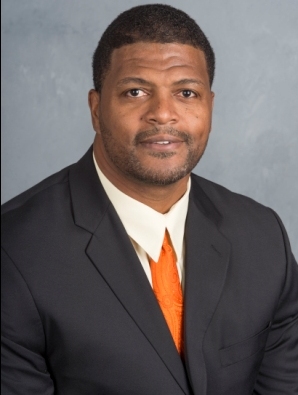By J.T. Keith
Many Division II athletes think they have the talent to play professionally. However, such thoughts never entered Mike Sinclair’s mind when he came to Eastern New Mexico University from Beaumont, Texas.
Sinclair’s dream was to get his education, then go home to teach and coach. Today, he is fulfilling his dream of coaching and teaching—only he’s  doing it in the National Football League. Sinclair is the defensive line coach for the Chicago Bears.
doing it in the National Football League. Sinclair is the defensive line coach for the Chicago Bears.
Sinclair played defensive end at ENMU from 1986-1990. He later would be named to the All-Lone Star Conference decade team and become a member of ENMU’s Hall of Honors.
Sinclair was drafted by the Seattle Seahawks in 1990. He played 11 seasons with the Seahawks and one year with the Philadelphia Eagles, retiring in 2002. Sinclair is second in Seahawks history with 73.5 sacks, and he went to three consecutive Pro Bowls from 1996-1998.
On Jan. 18, 2013, Bear’s head coach Marc Trestman hired Sinclair to coach the team’s defensive line.
Chase: What is it that impressed you about ENMU?
Sinclair: It was a small school with a lot of camaraderie among the student body. The classes were little, and I really liked that.
Chase: What was football like here at ENMU?
Sinclair: Our football team was a close-knit group of guys. We never thought about playing in the pros. It was about a group of guys just wanting to play football after high school.
Chase: When did you think you had a chance to make it in the NFL?
Sinclair: In my senior year, scouts would watch practice and our games. After the season, they worked me out. I honestly never thought anything about it. There are so many athletes who don’t make it.
Chase: Who was the best player you ever played with?
Sinclair: The whole starting defensive line at Seattle: Cortez Kennedy [who was enshrined in the NFL Hall of Fame in 2011], Sam Adams [who won a Super Bowl with the Baltimore Ravens], and Mike McQueary.
Chase: What is your advice for any Division II athletes who think they have what it takes to play pro ball?
Sinclair: If you have pro potential, whether you go to Division I, II, IA, or III doesn’t mean it’s an automatic ticket in. All it is is potential. If anything, it is even more work. You have to be about your work. You have to be a businessman. It’s not just football. Unlike college, where you’re a student and then athlete, once you pass that threshold, you take the next step into becoming a professional. I would say learn from the older guys; those guys have been there.
Chase: What have you seen through the years that you would like to pass on to others, whether they play pro ball or not?
Sinclair: I can only speak from an athletic point of view, but I think these attributes could carry over to any field of life. The main thing that I see are people in all lines of work that are not professional. I tell my guys all the time just because you’re a pro doesn’t make you a professional. You have to become a professional, come to work on time, study on your off days.
Transfer what you learn from the classroom onto the field. Learn from the veterans; there’s a reason why they are veterans. You have to become all those things. There are a lot of elements into being a professional.
Chase: What is the difference from the college game to the pros?
Sinclair: In college, you are a student first, an athlete second. If an athlete has pro potential, and you’re going to a team, whether as a free agent or you’re drafted, do your homework. Know whom they have and how many are at your position. Who is at your position? Find out who is on that team. Remember a bigger school is not necessarily a good thing. If you’re good enough, the scouts will find you.
Chase: What did you take away from your time at ENMU?
Sinclair: It was a good run. I enjoyed my time at Eastern. I’ve made some pretty good friends whom I’m still in contact with today, and my experience is nothing but positive.
